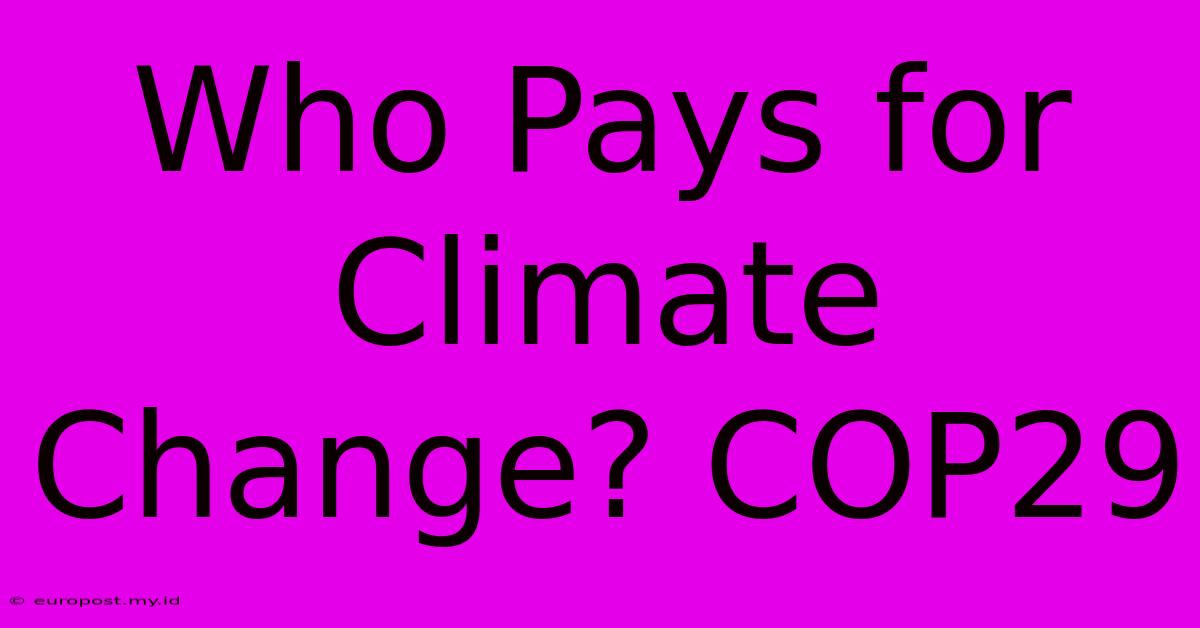Who Pays For Climate Change? COP29

Discover more in-depth information on our site. Click the link below to dive deeper: Visit the Best Website meltwatermedia.ca. Make sure you don’t miss it!
Table of Contents
Who Pays for Climate Change? COP29 and the Fight for Climate Finance
The 2024 UN Climate Change Conference (COP29) looms large, casting a long shadow over the critical issue of climate finance. Who pays for climate change? This question, central to global climate negotiations, will again be fiercely debated. The impacts of climate change are already being felt worldwide, from devastating floods and heatwaves to rising sea levels and extreme weather events. But the burden of these impacts, and the cost of mitigating and adapting to them, is far from equally distributed. This article delves into the complexities surrounding climate finance, examining the key players, the ongoing debates, and what we can expect from COP29.
The Unequal Burden of Climate Change
The stark reality is that countries least responsible for historical greenhouse gas emissions are often the ones suffering the most severe consequences. Island nations, for example, face existential threats from rising sea levels despite having contributed minimally to the problem. Similarly, many developing countries lack the resources to adapt to increasingly frequent and intense extreme weather events. This disparity forms the core of the debate surrounding climate finance.
Developed vs. Developing Nations: A Historical Divide
Developed nations, having industrialized first and benefited most from fossil fuel use, bear a significant historical responsibility for climate change. The principle of "common but differentiated responsibilities and respective capabilities" (CBDR-RC) recognizes this historical imbalance, emphasizing the obligation of developed countries to provide financial and technological support to developing nations.
The $100 Billion Promise: Unfulfilled?
At COP15 in Copenhagen (2009), developed countries pledged to mobilize $100 billion annually by 2020 to support climate action in developing countries. However, this target has yet to be met, raising significant concerns and trust issues. The shortfall undermines the credibility of developed nations and hampers the progress of global climate action.
Key Players at COP29 and Their Stakes
Several key players will shape the climate finance discussions at COP29:
- Developed Nations: Their commitments to financial contributions and the fulfillment of existing pledges will be under intense scrutiny. Differing national priorities and economic realities will influence their willingness to increase funding.
- Developing Nations: These nations will demand increased financial support for both mitigation (reducing emissions) and adaptation (adjusting to climate impacts). Their collective voice and negotiating power will be crucial in determining the outcome of COP29.
- International Organizations: The UN, the World Bank, and other multilateral institutions play vital roles in channeling funds, coordinating efforts, and promoting transparency.
- Private Sector: Private sector investments are increasingly important for scaling up climate action. Incentivizing and directing private investment towards sustainable projects will be a critical focus.
- Civil Society: NGOs, activists, and indigenous communities will play a critical role in advocating for ambitious climate finance targets and ensuring accountability.
Key Issues Expected at COP29 Regarding Climate Finance
COP29 will likely see intense negotiations on:
- Scaling up climate finance: The $100 billion target needs to be surpassed significantly, with new, ambitious targets set for the future.
- Balancing mitigation and adaptation: Ensuring sufficient funding for both aspects is essential, recognizing the urgency of reducing emissions while also addressing the immediate impacts of climate change.
- Loss and Damage: This refers to the irreversible impacts of climate change that cannot be adapted to. Developing nations will push for dedicated funding mechanisms to address loss and damage, a contentious issue in past COPs.
- Transparency and Accountability: Mechanisms for tracking and monitoring climate finance flows are crucial to ensuring effective and equitable distribution.
Beyond COP29: A Long-Term Vision
The outcome of COP29 will be significant, but it's crucial to understand that climate finance is a long-term commitment. Building trust, enhancing transparency, and fostering collaborative partnerships between developed and developing nations are vital for securing a sustainable future. The challenge goes beyond simply transferring money; it involves facilitating technology transfer, capacity building, and fostering sustainable economic development in vulnerable regions.
COP29 presents a pivotal moment. The question of who pays for climate change will continue to resonate, demanding robust solutions that reflect fairness, responsibility, and the urgent need for global climate action. The success or failure of COP29 in addressing this critical issue will profoundly impact the future of our planet.

Thank you for taking the time to explore our website Who Pays For Climate Change? COP29. We hope you find the information useful. Feel free to contact us for any questions, and don’t forget to bookmark us for future visits!
We truly appreciate your visit to explore more about Who Pays For Climate Change? COP29. Let us know if you need further assistance. Be sure to bookmark this site and visit us again soon!
Featured Posts
-
Gladiator 2 Missing May Calamawy
Nov 16, 2024
-
Business Intelligence Software Market Trends 2024 2031
Nov 16, 2024
-
Uefa Nations League Spain Vs Denmark Match
Nov 16, 2024
-
Nayanthara Dhanush Hated My Acting
Nov 16, 2024
-
Controversial Decision Taylor Wins
Nov 16, 2024
